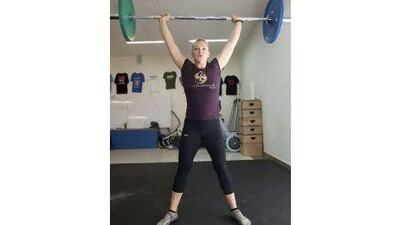DUBAI // The country's exercise-mad CrossFit community is gearing up for the Asia regional competition and a fight for the fittest title.
Founded in 1995, CrossFit is an intense daily workout programme that includes elements of weightlifting, gymnastics and cardiovascular training.
Every day, CrossFit enthusiasts compete against each other to complete the "Work Out of the Day" (WOD). A typical WOD might include several rounds of overhead squats, box jumps, pull-ups and burpees.
In 2007, about 70 people took part in the international CrossFit games and this year that figure has risen to 25,000 competitors.
While warming up for the final round of a six-week CrossFit Open competition last month, 26-year-old Briton Candice Howe tore a muscle in her inner thigh. Despite the injury, she managed to finish fourth out of about 250 people competing to qualify for the regional finals of the CrossFit games in Japan next month.
Now, she says she is determined to continue training, claim the "Fittest Woman in Asia" title and qualify for the final round of the CrossFit Games that will take place in California in July.
"There was a small tear in the muscle and my sports therapist said not competing is the best thing I could do," said Ms Howe. But she would not give up her dream of competing in Okinawa, Japan, next month: she is still training, but not putting too much stress on the affected muscle.
Ms Howe is a certified CrossFit trainer and the owner of a CrossFit-affiliated gym, LifeSparkDubai - one of only two gyms in the country officially licensed to practise CrossFit.
She's not the only CrossFit fanatic enthusiastic enough to train through the pain. Marcus Smith, 32, is also from Britain and was ranked first on the board for the Asia regionals until he was hurt during the fourth week of the competition.
"I have crushed the vertebrae in my neck, so I don't feel anything in my right arm at all," said Mr Smith, who eventually finished fifth and wants to be named "Fittest Man".
"A specialised chiropractor is working with me because I want to compete and win," said Mr Smith, the owner of Innerfight, a website that provides free access to workouts. "It's a case of the power of the mind over the body, and you just have to keep working through it."
Mr Smith often trains twice a day, putting his body through tremendous stress to prepare himself for the competition.
Mr Smith and Ms Howe both say they felt like something was missing in their lives before they discovered CrossFit.
Ms Howe, who lives in Dubai but was a gymnast in the UK, said there wasn't a gymnastic community for her to compete. Through CrossFit she found her calling again.
"CrossFit has given me something back that I feel I am good at."
And, she says, the training is helping women break stereotypes: "We are getting people who are diabetic and told to be careful as to what exercise they do. We've also got men and women who have day jobs and never thought they'd get back to lifting."
Consider the Emirati mother-of-three Mai Salem Ahmed, 31, who collapses on the floor after finishing a WOD and immediately asks: "Did I beat the guys?"
"Training has been really good for me and I have achieved the body I want through CrossFit," she says.
Tamra Ferguson, a 37-year-old American, said she enjoys CrossFit because it never gets boring. "CrossFit is the only exercise I have ever stuck with because it's always challenging and exercises are never repetitive," she says. "Also, doing a pull-up on your own is an amazing feeling."
Craig Harriman, 21, from Britain, said what he likes most about CrossFit is the community.
"It's not just that you see results, but the competitive atmosphere within the team which feels like a family." Mr Harriman is also attending the Asia regionals, and currently ranks 10th.
For all those reasons and more, CrossFit continues to win new fans. "I think Dubai has a bad reputation in terms of being unfit, but I don't think that's necessary," said Ms Howe. "For as many people who come to the UAE and gain weight, there are those who come here and change their lives."

